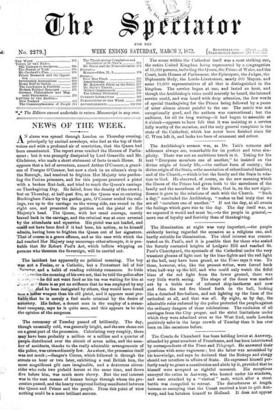The Archbishop's sermon was, as Dr. Tait's sermons and addresses
always are, remarkable for its perfect and terse din- plieity. There was not an ambitious touch in it. Taking for his text "Everyone members one of another," he insisted on the divine origin of family life,—the earliest form of society ; the divine origin of the State, —the association of subordinated families; and of the Church,—which is but the family and the State in rela- tion to God. He observed, of course, on the new meaning which the illness of the Prince had given both to the sacredness of the family and the sacredness of the State, that is, on the new signi- ficance it gave to the relations of each with the Church. "Such a day," concluded the Archbishop, "makes us feel truly that we are all 'members one of another.' " If not the day, at all events the feelings which gave rise to the day. The day itself was, as we expected it would and must be,—to the people in general,— more one of loyalty and festivity than of thanksgiving.


































